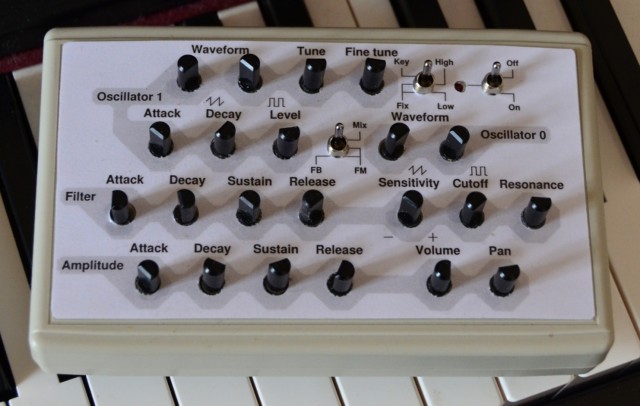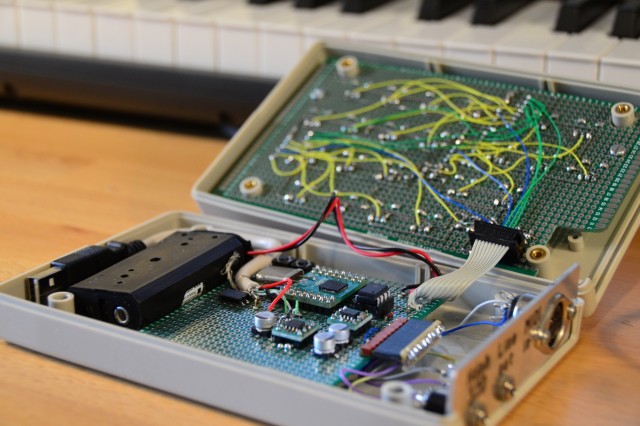
Goom is an ambitious DIY MIDI synthesizer module, based on a low-cost microcontroller.
It’s a virtual analog synth that offers 16-voice polyphony and it is fully multitimbral. According to the developer, the total cost of the basic components to make a fully-working synthesizer is just a couple of pounds; the bulk of the cost is in the (optional) knobs and switches panel interface.
Here’s and audio demo track, recorded in a single take from Goom’s analog output. No effects were added:

Features:
- Sixteen-voice polyphonic synthesizer
- Fully multitimbral (different patch on each MIDI channel)
- Analogue front panel patch set-up for MIDI channel 1
- Patch set-up using MIDI control change messages for channels 2 to 16
- Two oscillators per voice: sine, sawtooth, square, pulse and intermediate waveforms
- Oscillators can be mixed or combined using frequency modulation or frequency modulation plus feedback
- Three envelope generators per voice (one ADSR and one AD for amplitude, one ADSR for filter)
- Low-pass filter for each voice with resonance control
- Velocity scaling on amplitude and filter cutoff
- Stereo output with pan and volume control for each patch
- 24-bit digital-to-analogue converter
Details on Goom, including circuit design and firmware, are available.
via hackaday

Is there a kit coming? really interested in this one!
in a.word. no. Thanks. that’s two words. I want to die
Not too shabby, gents. Nice specs for a little box.
This synth is made similar to the stuff jan ostman(dsp synth ju-x Jupiter clone) is doing, except this is free and the manufacturer isn’t here talking shit on their potential customers.
I’d like to hear it. Also it’d be nice if it came in a nicer box. Looks interesting though.
It’s a diy synth, so put it in any box you like!
Also, an audio demo is in the post. I
nice project !! a LFO + PWM would be welcome….
Seconded, looks very cool but I miss at least one LFO to give it some movement.
The pots are a couple of pounds EACH.
This is fascinating. It’s a great way to get people who are into circuitry to get into electronic music, or people who are into electronic music to get into circuitry and DIY stuff.
High,
what ist the WM 8672 for an DAC, I find nothing about it in the Internet?
Is it a wrong name for this item or what can I take as an replacement?
Spencer.
High Spencer,
I think the numbers got switched. As I recall WM8762 is correct. Additionally the code has been ported to the STM32F4 discovery board so no soldering is required if you just need USB MIDI and a stereo audio output. This is the video demo I made playing the ST version: http://youtu.be/3-M-s6O-YW8
Hi Spencer
I’ve checked the data sheet and found a USB-Connector Molex WM8672-ND. It seems to be a WM8727 DAC. It’s a 24-bit high performance stereo DAC.
Greetings
Roman